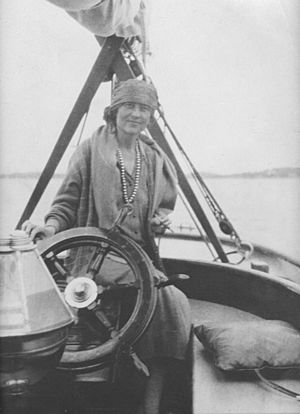Elsie Clews Parsons facts for kids
Quick facts for kids
Elsie Clews Parsons
|
|
|---|---|

Parsons aboard her schooner, the Malabar V.
|
|
| Born |
Elsie Worthington Clews
November 27, 1875 |
| Died | December 19, 1941 New York City
|
| Education | Ph.D. in Sociology, Columbia University (1899) |
| Occupation | Anthropologist |
| Spouse(s) | Herbert Parsons |
| Children | Elsie ("Lissa", 1901) John Edward (1903) Herbert (1909) Henry McIlvaine ("Mac", 1911) |
| Parent(s) | Henry Clews, Lucy Madison Worthington |
| Relatives | James Blanchard Clews (cousin) |
Elsie Worthington Clews Parsons (born November 27, 1875 – died December 19, 1941) was an American anthropologist, sociologist, folklorist, and feminist. She studied Native American tribes like the Tewa and Hopi in Arizona, New Mexico, and Mexico.
Elsie Parsons helped start The New School, a university in New York City. She was also involved in many important groups. She was an editor for The Journal of American Folklore from 1918 to 1941. She led the American Folklore Society (1919–1920) and the American Ethnological Society (1923–1925). Right before she passed away, she became the first female president of the American Anthropological Association in 1941.
She went to Barnard College and earned her first degree in 1896. She then continued her studies at Columbia University, where she received her master’s degree in 1897 and her Ph.D. (a very high academic degree) in 1899.
To honor her work, the American Ethnological Society gives out the Elsie Clews Parsons Prize every two years. This award is for the best essay written by a graduate student.
Contents
About Elsie Clews Parsons
Elsie Parsons was born into a wealthy family in New York. Her father, Henry Clews, was a successful banker. Her mother was Lucy Madison Worthington. Elsie also had a brother, Henry Clews Jr., who became an artist.
In 1900, Elsie married Herbert Parsons. He was a Republican congressman (a person elected to make laws for the country) for three terms. He was also a political friend of President Teddy Roosevelt. While her husband was in Congress, Elsie published two books that caused some discussion. She used a pseudonym (a fake name), "John Main," for these books.
Elsie became very interested in anthropology around 1910. Anthropology is the study of human societies and cultures. She believed that folklore (the traditional stories, customs, and beliefs of a community) was a great way to understand a culture. She also thought that anthropology could help bring about positive social change in the world.
One of her most famous books is Pueblo Indian Religion. In this book, she brought together all her detailed research and the work of other experts. While her work is considered important, some of her research methods are viewed differently today.
Her Feminist Ideas
Elsie Parsons had very strong ideas about feminism, which were quite unusual for her time. Feminism is the belief that women and men should have equal rights and opportunities.
She supported the idea of divorce by mutual consent. This means that if both a husband and wife agree, they should be able to end their marriage. She wrote about this in her 1906 book, The Family.
Elsie also wrote about how society affects people's growth. She focused on how expectations about gender roles (what society expects men and women to do) can stop both women and men from growing as individuals. Because her ideas in The Family were met with strong reactions, she used the pseudonym "John Main" for her next book, Religious Chastity (1913). She did this so her ideas wouldn't affect her husband's political career.
Her ideas were so far ahead of her time that people only started discussing them more widely after her death. Because of her writings and how she lived her life, Elsie Parsons is now seen as one of the early leaders of the feminist movement. She helped start important conversations about gender equality.
Elsie Parsons' Books
Elsie Clews Parsons wrote many books during her career.
Early Sociology Books
- The Family (1906)
- Religious Chastity (1913)
- The Old-Fashioned Woman (1913)
- Fear and Conventionality (1914)
- Social Freedom (1915)
- Social Rule (1916)
Anthropology Books
- The Social Organization of the Tewa of New Mexico (1929)
- Hopi and Zuni Ceremonialism (1933)
- Pueblo Indian Religion (1939)
Ethnography Books
- Mitla: Town of the Souls (1936)
- Peguche (1945)
Folklore Research Books
- Folk-Lore from the Cape Verde Islands (1923)
- Folk-Lore of the Sea Islands, S.C. (1924)
- Micmac Folklore (1925)
- Folk-Lore of the Antilles, French and English (3 volumes, 1933–1943)
See also
 In Spanish: Elsie Clews Parsons para niños
In Spanish: Elsie Clews Parsons para niños
 | Lonnie Johnson |
 | Granville Woods |
 | Lewis Howard Latimer |
 | James West |

